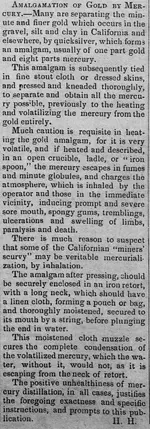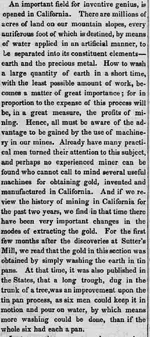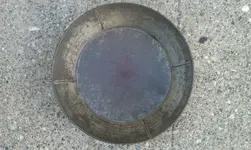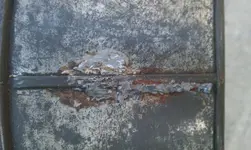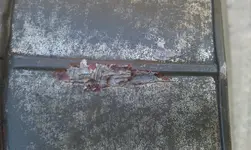Quicksilver Machines
George Payson in the first-hand account of his journey to the mines, Golden Dreams and Leaden Realities, published in 1853, tells of a "Virginia Rocker" brought all the way from the East, as well as other gold recovery machines, utilizing quicksilver as well.
We may note from the following article, reference to the use of quicksilver (mercury), in the Carolina and Georgia gold mines, occurring before California's great rush in 49'.
From the Sacramento Transcript, May 9, 1850:
Machinery.
In this age of the world the chance of success is small to any one who depends entirely upon main strength. Every day witnesses some improvement, by which those early to take advantage of it steal a march on all competitors. Modern genius is doing wonders in every department of life. The world is becoming civilized, if we may use the expression, by steam; and electricity is bringing hitherto distant lands into close proximity, and binding them together in nervous sympathy. The great saving in labor which has been brought about by modern improvements,and the introduction of machinery, has already had, and must continue to have an important influence upon the affairs of the world. And every new invention, which economises in this respect, should be considered a blessing to society.
An important field for inventive genius, is opened in California. There are millions of acres of land on our mountain slopes, every auriferous foot of which is destined, by means of water applied in an artificial manner, to be separated into its constituent elements — earth and the precious metal. How to wash a large quantity of earth in a short time, with the least possible amount of work, becomes a matter of great importance ; for in proportion to the expense of this process will be, in a great measure, the profits of mining. Hence, all must be aware of the advantage to be gained by the use of machinery in our mines. Already have many practical men turned their attention to this subject, and perhaps no experienced miner can be found who cannot call to mind several useful machines for obtaining gold, invented and manufactured in California. And if we review the history of mining in California for the past two years, we find in that time there have been very important changes in the modes of extracting the gold. For the first few months after the discoveries at Sutter's Mill, we read that the gold in this section was obtained by simply washing the earth in tin pans. At that time, it was also published in the States, that a long trough, dug in the trunk of a tree,was an improvement upon the tin pan process, as six men could keep it in motion and pour on water, by which means more washing could be done, than if the whole six had each a pan.
Last year the common rocker came into almost universal use. In the course of the season, however, quicksilver machines began to be talked of, and several lots of the kind used in Carolina and Georgia arrived here, and brought enormous prices. These machines weighed from three to four hundred pounds, and many who paid one thousand dollars to procure one, were subjected to an expense of one or two hundred dollars in getting it to the diggings. When there, if the proprietors were not fortunate enough to stop in a favorable location for mining, the expense and labor of constantly moving these unwieldy machines generally discouraged their use.
Recently, quicksilver has come more generally into use, and the advantage thus gained is beginning to be appreciated. Where miners have decided to remain long in a single place, they can well afford the expense necessary to commence operations on scientific principles. Light machines have been manufactured to be used in connection with quicksilver, which do away with the principal objections against the heavy rockers of Georgia origin. So. great is the demand for mining implements,, that their manufacture is attracting the attention of mechanics, and already may be found in every town of any note establishments devoted' exclusively to this business.
An extensive concern of this kind may be found in this city, on M street, near the Pacific Theatre. Messrs. Woodcock & Burnett, the proprietors, came to this country last year, and spent a part of the season in the mines. Being ingenious mechanics, they found, after a little experience, that a vast amount of labor could be saved by having proper tools to work with. They came to this city and established themselves in their present location, and commenced making such machines as were called for. Meanwhile, Mr. W. built a machine on a plan of his own, which has since been used a good deal, and it certainly has the appearance of being an important improvement. It is called "Woodcock's Double Action Machine." It is about five feet long, with a coarse riddle over the whole length of the top, and a fine riddle extends about three feet underneath the coarse one ; the latter carrying off the principal part of the sediment that falls through the one above, while the fine gold or dust falls through it into quicksilver. It is so constructed, that the coarse gold lodges before it reaches the quicksilver. The whole apparatus weighs only seventy-five pounds, and it can be divided into two parts of about equal weight; thus it can be moved from place to place, without difficulty. From four to six men are required to work this machine to advantage.
Messrs. W. &, B. also manufacture the Burke Rocker, long in use in the gold mines of Georgia. They have reduced its weight from three or four hundred, to seventy-five pounds, while the machine still retains all its original qualities. The common rocker is constructed by these gentleman in an improved manner, as by a trifling alteration in the construction of the upper part, quicksilver can be used, it is said, advantageously. These machines only weigh from fifteen to twenty-five pounds, and, whenever the miner wishes to move, ten minutes time is all that is necessary to make preparations for a journey. Hence these machines are extensively used, and will continue to be, till people become less restless, and commence operations on a more permanent basis than has heretofore been the case.
CC Hunter






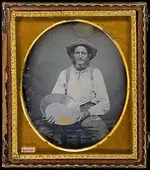
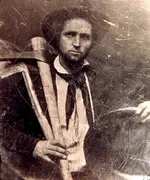
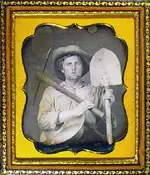
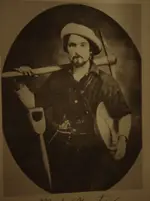
 BRAVO!!Very astute you are!!That is exactly right,and is the only place it is published.He is the great Grand Father of the the Very Prominent Sanguinetti Family.He actually made his fortune twice after having the first stolen from him by his partner.He married the Love of his Life(I believe her name was Rose(?))
BRAVO!!Very astute you are!!That is exactly right,and is the only place it is published.He is the great Grand Father of the the Very Prominent Sanguinetti Family.He actually made his fortune twice after having the first stolen from him by his partner.He married the Love of his Life(I believe her name was Rose(?))

